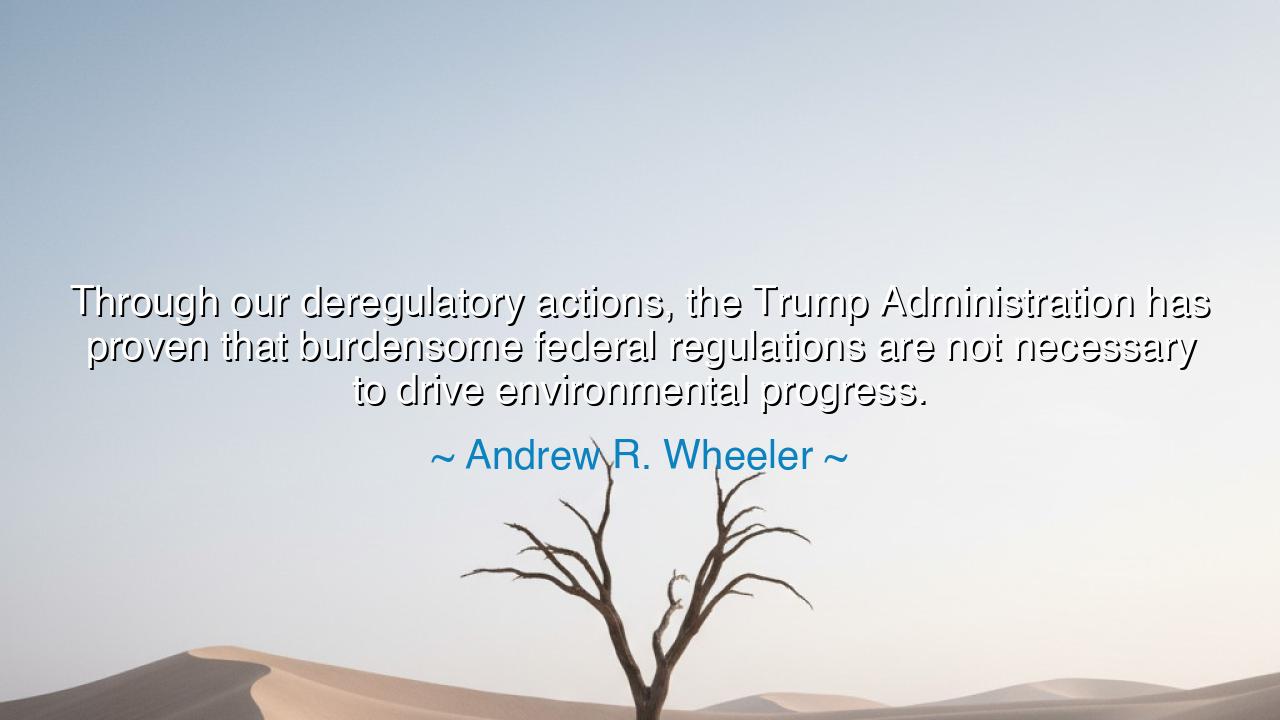
Through our deregulatory actions, the Trump Administration has
Through our deregulatory actions, the Trump Administration has proven that burdensome federal regulations are not necessary to drive environmental progress.






Hear the words of Andrew R. Wheeler, spoken from the seat of power as he sought to shape the destiny of a nation’s stewardship: “Through our deregulatory actions, the Trump Administration has proven that burdensome federal regulations are not necessary to drive environmental progress.” These words carry with them both defiance and conviction, for they challenge the long-accepted belief that only strict laws and heavy oversight can guard the earth. Instead, Wheeler proclaims that freedom, innovation, and lighter hands upon the reins may also lead to renewal and protection.
When he speaks of deregulatory actions, he refers to the deliberate cutting back of rules and restrictions once laid upon industry. Many feared that such actions would unleash destruction, allowing greed to poison rivers and blacken skies once again. Yet Wheeler argues that by trusting states, communities, and private enterprise to innovate, one can still achieve environmental progress without the crushing weight of what he calls “burdensome” oversight. In his vision, less regulation does not mean lawlessness, but a different path—one guided by ingenuity and responsibility rather than endless federal decree.
The phrase “burdensome federal regulations” is heavy with meaning. For in truth, laws designed to protect can sometimes choke growth, stifle invention, and impose costs so great that they hinder rather than help. Wheeler suggests that progress is not born from bureaucracy alone, but from the creativity of people and businesses seeking to do better for themselves and for the land. Here lies the paradox: can loosening control lead to greater care? Can less government command still bring forth more stewardship? His words declare that it is possible.
History offers us an example in the story of Chlorofluorocarbon (CFC) replacements after the Montreal Protocol. When nations banned harmful chemicals that were tearing the ozone layer apart, many feared economic disaster. Yet once the burden was lifted from old methods, innovation thrived. Companies developed safer alternatives more quickly and cheaply than regulators imagined. This moment revealed that sometimes, freeing human creativity achieves results faster than rigid control. Wheeler’s claim stands in the shadow of this truth: that progress can be spurred by innovation as well as regulation.
The deeper meaning of his words is that environmental stewardship must be dynamic, not static. Laws are needed, yes, but they must not become idols. If they become too heavy, they risk strangling the very progress they were meant to encourage. True guardianship of the earth may at times require pruning the tree of regulation, so that new growth may emerge. Yet this path requires vigilance, for without careful oversight, liberty may slide into neglect, and innovation may yield to exploitation.
This teaching is both a caution and a challenge. A caution, because it reminds us that neither regulation nor deregulation alone is the answer—both can be abused, and both can fail. A challenge, because it calls upon individuals, communities, and industries to take responsibility into their own hands, proving that they can act with integrity even when the hand of government is lighter. For if they fail, the earth itself will bear the scars, and future generations will pay the price.
Children of tomorrow, let this wisdom be planted in your hearts: freedom without responsibility is destruction, but responsibility embraced in freedom can be a source of greatness. Do not rely solely on law to restrain you; restrain yourselves with conscience. Do not wait for regulation to demand care; innovate and protect by choice. In your homes, your businesses, your communities, take ownership of the environment that sustains you. Show by your deeds that stewardship need not always be compelled, but may flow from duty, honor, and love of the earth.
Thus, the wisdom of Wheeler’s words endures: that environmental progress is not the child of regulation alone, but can spring from responsibility freely chosen. Balance, discernment, and vigilance must guide this path. For only when liberty and duty walk hand in hand can the earth be preserved—not by compulsion alone, but by the willing hands of those who know it is their sacred inheritance.






AAdministratorAdministrator
Welcome, honored guests. Please leave a comment, we will respond soon